 |
| Download pdf file | Newsletter archives | |||
| Dieser Newsletter auf Deutsch | Cette newsletter en français | |||
 |
1. Brexit trembles while the Swiss resolve |
 |
|
High Court forbids EU withdrawal without a vote of parliament
On 3 November 2016, the High Court in London ruled that the British Prime Minister may not trigger the request to leave the EU without beforehand, requesting permission from Parliament. The government appealed against the ruling and the case came before the United Kingdom's Supreme Court of Justice from 5 to 8 December 2016. The verdict will fall at the end of January 2017. It still remains completely unclear what goals the government is pursuing and their Brexit plans are not to be made public before February 2017. The two-year negotiation period with the EU will then begin, following the official request at the end of March 2017.
Brexit legislation would have to be submitted to the House of Commons and Lords, potentially jeopardizing the timetable. It is also possible for Members of Parliament not to agree on a common position (hard or soft Brexit). The conservatives have only a narrow majority in the House of Commons. The opposition leader, Jeremy Corbyn, wishes to force early parliamentary elections in spring 2017, if the government does not agree to Labour's "Brexit bottom line". This includes continued access to the single market and guarantees on workplace rights.
On 9 December 2016, it was announced that English Brexit opponents are taking legal action in Ireland's High Court. The filing in Dublin is formally directed against the Irish State, the European Council and the European Commission. The aim is to bring the matter before the European Court of Justice in Luxembourg for a ruling on the constitutionality of the Brexit. Such an approach through the legal instances could prevent the United Kingdom from withdrawing from the EU for several years, since a legally water-tight Brexit is hardly possible without a ruling from Luxembourg. A further legal case is in the pipeline on the question whether the United Kingdom has also to request its withdrawal from the EFTA free trade agreement, along with its withdrawal from the EU, since otherwise membership in the European single market would continue (as with Norway).
Overview of current developments on Brexit Assessment: Why Brexit may not happen
The political climate is on the turn
Opinions are slowly shifting in the population. Two thirds reject a "blind-date Brexit". A poll held on 10 December 2016 showed that voters do not accept a Brexit, which would leave them financially worse-off. In the wake of continued uncertainty over the economic and monetary trends, the polls show that the pro-Brexit majority has collapsed. Two former prime ministers are demanding a second referendum: Tony Blair from Labour and John Major from the Conservative party.
By-elections for the House of Commons took place in three constituencies in autumn 2016. They showed a trend which could potentially shake up the party system. The conservatives have suffered minor losses, which could threaten their narrow majority in the House of Commons. The Labour party slipped to the third and fourth places, and as an anti-Brexit party, the left liberals LibDems, were able to gain strongly and even beat Labour. There is talk of uniting all anti-Brexit parties on the left of the conservatives into a "progressive alliance". The left wing of Labour does not support the idea. This could therefore eventually lead to a split of the Labour party, into a social-democratic majority-wing, cooperating with the "progressive alliance" and a small left-wing party following the leader Corbyn.
Power struggle in the largest trade union
Press article on the current general secretary Press article on the challenger
Forthcoming event
A British political advisor will give a report on the current situation following the Brexit referendum at the annual EWC conference to be held in Hamburg on 30 January 2017.
Switzerland ignores the referendum on immigration
The law contradicts the result of the referendum "stop mass immigration" from February 2014. At the time the population had decided by a narrow majority (50.3%) to restrict immigration from the European Union through annual limits and quotas. Implementation of the referendum would have violated the freedom of movement agreement with the EU and triggered a "Guillotine clause", invalidating all bilateral contracts between Switzerland and the EU and provoking a "Swissexit" (see report in EWC News 3/2016).
Bitter defeat for Populists
Press article on National Council vote Swiss People's Party press statement on their political defeat Remarks from a Swiss People's Party MP
Blueprint for the Brexit?
The tough attitude of the European Union on the issue of freedom of movement is also a clear signal towards the United Kingdom. As previously in Switzerland, the country is under the illusion that they can benefit from the advantages of the single market without abiding by its rules. According to the prime minister of Malta, who takes over the rotating presidency of the EU at the beginning of 2017, Brexit talks will be more or less like what happened with Greece. The population there had rejected demands of the EU by a referendum held on 5 July 2015, but which in the end only lasted a few days.
The opinion of Malta's Prime Minister |
 |
2. Legislative initiatives in individual countries |
 |
|
No Board-level participation in Britain
In a speech to the Congress of the Confederation of British Industry (CBI), held on 21 November 2016 in London, Theresa May explained that she does not plan any legal obligation for board-level employee participation. She had promised this during the election campaign for party leadership in July 2016 and at the Conservative's Party Congress at the beginning of October 2016. Literally her words to the CBI congress were:
While it is important that the voices of workers and consumers should be represented, I can categorically tell you that this is not about mandating works councils, or the direct appointment of workers or trade union representatives on boards.
Instead, she would like to establish advisory councils or panels running alongside the board of directors to represent the interests of other stakeholders. The government published a Green Paper on the subject on 29 November 2016, which presents the different options under debate. This includes the appointment of a non-executive director who has an explicit obligation to engage with the workforce, to report into the board, to chair a stakeholder panel and influence the renumeration committee. A public consultation is being held up to 17 February 2017, to which all interest groups can submit comments.
Report on the government’s new propositions Press release on launch of the public consultation Proposals from the British Trades Union Congress (TUC)
Better protection for Whistleblowers in Sweden
Swedish law on freedom of press dates back from 1766 and is the oldest in the world. It provides a protection for public service employees through the "meddelarfrihet" (freedom to communicate with the media). However, these regulations do not apply to private companies. The rules are to be extended in April 2017, to cover private healthcare, education and welfare firms working with public funding.
Contents of the new whistleblower legislation Report on the extension of freedom to communicate Overview: Protection of whistleblowers in others EU Member States
Overseeing humane working conditions in the supply chain
The plan must be part of the board's public reporting. Trade unions and civil society organizations may contribute to it. The new legislation aims at providing better prevention against the violation of human rights, damage to the environment or health hazards such as in Bangladesh where the collapse of a factory building in April 2013, killed over 1,100 employees (see report in EWC News 3/2013). It applies to approximately 150 French companies with at least 5,000 employees in France or 10,000 worldwide and provides fines of up to 30 million €. It comes into force in February 2017.
Report on the adoption of the law Similar request to the German Bundestag |
 |
3. Examples from the digital working world |
 |
|
Right to home office at German car manufacturer
Physical presence, fixed working spaces, rigid working hours are becoming more and more redundant if not counterproductive in today's digital business world. Modern companies are results-based, not time-oriented. The participation process is also noteworthy in the Daimler example. In summer 2015, around 33,500 employees had responded to a detailed on-line questionnaire. The results were then discussed and further developed in 37 half-day workshops organized in all German sites with 1,000 participants from all hierarchical levels of the company.
Report on the participation procedure
French telecoms group regulates digital transformation
The agreement specifies the opportunities, impact and risks of the digital transformation and aims at achieving a balance between private and working lives. Management explicitly recommends therefore, that employees do not use their electronic communication networks and means of communication during the daily and weekly rest periods and on holidays. Management must set the example in the use of remote digital devices and is responsible for guaranteeing a right to disconnect. The proper use of personal data has also been regulated. Orange also concluded a global agreement on occupational health and safety, in November 2014 (see report in EWC News 4/2014).
CFDT trade union press statement
Codetermination rights for works council in social networking
The court was ruling on legal proceedings for the German Red Cross. Following the installation of a Facebook page for the blood donor service in 2013, there had been criticism of individual employees with their names publicly mentioned. The works council wanted to prevent this public pillorying and took legal action. The highest German labour court did not agree to a right to codetermination for websites on the Internet. However if a posting functionality is introduced then the works council has to be consulted beforehand. The judgement concerns all companies in Germany having a presence on the Internet which incorporates a comments functionality.
Federal Labour Court press release Background report on the ruling |
 |
4. Groups undergo restructuring |
 |
|
German retail group splits in two
In former times Metro was the largest retail group in Germany. Following the sale of the Kaufhof department stores to the Canadian group, Hudson's Bay in 2015, there are still almost 218,000 people currently working for Metro, including 84,000 in Germany. In the opinion adopted by the EWC, members warned of the threat of more job cuts and the spin-off of further divisions. The EWC is expecting a written answer from central management, explaining how the split-up could also be of benefit to the employees and not only to shareholders. The Metro Euro-forum has existed since 1999. Following the company split-up, there will be two separate European works councils.
Press article on the Euro-Forum meeting
Airbus central management informed the SE works council on 4 October 2016 that it wishes to consolidate the research and IT divisions of the Holding into the aircraft construction subsidiary and concentrate them in Toulouse. Many of the services based in the headquarters in Suresnes (near Paris) and Ottobrunn (near Munich) are to be relocated to the South of France.
Since then, there have been several extraordinary meetings of the SE works council and finally exact figures were communicated on 29 November 2016. There will be altogether 1,164 job losses, including 429 in Germany, and the plant in Suresnes is to be completely closed by mid 2018. So far, it is still unclear whether or not there will be any forced redundancies. The Airbus European works council had still managed to avoid this as a result of consultation in April 2014 (see report in EWC News 2/2014). The SE works council was established under Dutch jurisdiction, after Airbus group's SE conversion in 2015 (see report in EWC News 1/2015). The legal headquarters of the Holding could also possibly be shifted from Amsterdam to Toulouse.
Overview of job losses per division Information on Suresnes plant closure |
 |
5. European works councils undergo restructuring |
 |
|
Reconfigured EWC before merger even implemented
Following the announcement of the merger, a joint coordination committee of both EWCs was established and held monthly meetings with central management. The purpose of this regular involvement process was to avoid delaying the merger through consultation procedures. 400 of the 2,500 jobs in Italy are to be lost due to the relocation of administrative services to Germany. One plant in Belgium has to be sold. Although the merger has not yet been finalized, the constitutional meeting of the merged EWC took place already on 14 September 2016 in Hockenheim (Germany), and included discussions on the request for an international framework agreement.
The EWC agreement of HeidelbergCement dating from 2012 is to continue unchanged. After the sale of the plant in Belgium there will remain only one country in which both companies do business, i.e. Spain. New EWC elections have been held there. Likewise, new elections have also been held in all other countries where Italcementi has a presence, based on HeidelbergCement's rules for appointing representatives. The steering committee has been expanded from five to seven members, including two members from Italcementi. Italcementi's EWC agreement which was revised last in 2007 (see report in EWC News 2/2007), is now no longer valid.
Report on a meeting of the joint coordination committee Report on the request for a framework agreement
Saint-Gobain has already a "Convention for European Social Dialogue" since 1988 and thereby belongs to the pioneers of EWC history. The EWC agreement continues to this day on a "voluntary" basis (see report in EWC News 2/2009). The situation is different for Verallia, where a full-fledged European works council was completely renegotiated based on the regulations of the new EU Directive, and following the official path, by a Special Negotiating Body.
The EWC is composed of at least one representative per country, and additional seats are allotted according to the size of the workforce. No upper limit has been set since the membership is dynamically increased in the case of company acquisitions. The steering committee which is made up of five members, holds discussions between the annual EWC meetings and is consulted in exceptional circumstances. It can involve other delegates, who are directly concerned by any planned measures. As is common practice in France, there are extensive provisions for the assistance of experts including an annual budget of 30,000 €.
Prior to the sale of the company to a US financial investor there had been strikes to obtain financial compensation at the seven French sites. In France there is a legal right to profit-sharing for employees (see report in EWC News 2/2016). Since Verallia was sold through an LBO (leveraged buyout), the workforce loses its previous profit-sharing of 30% for the next seven years. Explanation: following an LBO the cost of financing the company acquisition has to be recouped.
Bayer subsidiary establishes independent EWC
The agreement was not negotiated by a Special Negotiating Body (SNB) and can be considered as an updated version of the "voluntary" Bayer agreement dating from 1994. It is therefore, neither subject to the EU Directive nor to German EWC legislation. The text is largely inspired from the parent company's regulations and to a large extent, the new EU standards on Information and Consultation have been integrated. Following the Belgian works council model, the Forum is a mixed body. Each country sends one to four management representatives to the Forum meetings, including the respective human resources manager. Unlike in Belgium however, a works council member chairs the meetings. The Forum meets once per year at company headquarters and once in every three years in another country.
The administration of the Forum, as well as all consultation procedures for exceptional circumstances, are managed by a parity-based commission which includes one employee representative for each large country. It meets four times per year and can be called in as a "Clearing house", if any of the principles of corporate social responsibility have been violated in a particular country. In November 2014, Bayer's European Forum had come to a written deal with the management on social guidelines for the period prior to the stock market flotation and beyond (see report in EWC News 4/2014). |
 |
6. Newly established European works councils |
 |
|
European works council for Rubber factories
As foreseen in the EU Directive, there is one annual plenary meeting and the EWC select committee is composed of five members from different countries. In exceptional circumstances the EWC has an "appropriate" amount of time (without any fixed deadline) to examine all documents and for the elaboration of its opinion. The following provisions are however considerably better than the EU standards: Once the EWC has rendered its opinion it meets with central management with the goal of reaching an agreement. Such extensive consultation provisions are only to be seen elsewhere in SE works councils (see report in EWC News 1/2015). At any time the EWC may commission one or several experts and establish working groups on specific topics or projects in which employees, who do not belong to the EWC, may also participate. The EWC agreement provides for an arbitration procedure to settle disputes, based on the regulations of the arbitration board of the German Works Constitution Act for national works councils.
A EWC agreement for Schreiber Foods was signed on 23 November 2016 in Madrid. The EWC falls fully under the scope of the new EU Directive. 1,500 employees in Europe are represented by 13 delegates from five countries, including seven from Spain and two each from Czechia and Bulgaria. Portugal and Slovakia have one seat each. The negotiations could be concluded in as little as nine months.
Compared with other US companies the agreement is quite favorable to employees and goes beyond minimum EU Directive standards. A plenary meeting is held once per year. The five member select committee meets likewise once per year with central management and is consulted in exceptional circumstances. As common in Spain, each EWC member receives an hourly allowance: 60 hour time-off work per year in addition to the time for meetings. These hours may be transferred to others representatives. Schreiber Foods has 7,000 employees outside Europe and has had a presence in Europe since 2013 as a consequence of acquiring plants from Danone and Senoble, the French food manufacturers. Schreiber Foods only reached the threshold for the scope of the EWC Directive because of the Spanish plants, which represent half of the European workforce.
|
 |
7. Updated EWC agreements |
 |
|
Improved regulations for French electrical group
A new EWC agreement for Legrand was signed on 22 June 2016 in Limoges (central France). With 36,000 employees, it is the world's market leader in the manufacture of electrical components. The EWC was established in 2000 and its agreement last revised in September 2013 (see report in EWC News 4/2013).
In the future, the number of meetings of the select committee with central management is to be increased from two to three annually and the possibility for video conferences explicitly mentioned in the agreement. The threshold of employees concerned by restructuring, above which a consultation of the EWC should take place, is very low in Legrand. In the future however, only employees who are relocated more than 50 kms. will be taken into account. If more than 30 layoffs take place in one country due to a transnational project, then in principle, the EWC is always to be involved.
The extended competence of the EWC also leads to a heavier work load. Dedicated office space has therefore been provided for the EWC secretary for the first time and the budget for administration materials increased from 5,000 to 6,000 € per term of office. The annual time-off work allowance, which is exactly defined in France, has been raised for the secretary from 120 to 200 hours, for select committee members to 160 and for other EWC members from 20 to 40 hours. The time for meetings with the employer as well as for preparation or follow-up is not included here. Additional consultation procedures require also a larger budget for experts, which has been increased from 60,000 to 90,000 €s per annum. The EWC is chaired by the employer following French custom.
German motorhome manufacturer renews EWC agreement
Consultation procedure relieves time pressure on local works councils
Due to the special structure of the company, the EWC is not only responsible for transnational matters, but also for all matters affecting local sites. In general, it is informed about any planned restructuring before the local work councils. Once the information phase, for which there is no fixed deadline, has been concluded, the consultation procedure begins. The EWC has one month to render its opinion. The local work councils' consultation procedures may only be concluded once the procedure at the European level has been finished. Since there are strict deadlines for the local works council in some countries, the EWC agreement of Hymer relieves the local work councils of any time pressure and makes a consistent strategy possible. Local works councils have explicitly the right to delegate matters to the European works council giving them, if necessary, an enhanced role. Disputes between EWC and central management are settled by a parity-based arbitration board with a neutral chairperson. Legal action can only be taken afterwards.
Family Holding in Luxembourg updates EWC agreement
The European works council has 16 members, including five from Romania, four from Belgium and two from Croatia. Luxembourg does not have a seat, since the holding has fewer than 50 employees. Each country with more than one representative has to represent different subsidiaries. The EWC meets once in the autumn, in a different country each year. A half-day visit of the manufacturing plant is always organized on-site. The select committee meets twice per year with central management. The agreement describes in detail how the consultation procedure begins for exceptional circumstances but does not however define any deadline for rendering an opinion. One special feature of the EWC agreement is the national coordination meetings, whereby members and substitute EWC members meet twice per year with their local country employee representatives. This is important in countries where there is no central works council. |
 |
8. New SE conversions |
 |
|
No codetermination for Japanese-controlled automobile supplier
Sumitomo Electric Bordnetze, founded as a joint venture between Volkswagen and Siemens in 1986, was sold to Japanese electronics group, Sumitomo, in 2006. The European works council established in 2003 under German jurisdiction, is now replaced by a new SE works council. It represents 12,500 employees in eight EU Member States and has 16 members, including five from Romania and three each from Bulgaria and Poland. It meets in different countries twice per year. The steering committee is composed of five members who meet twice annually.
The SE works council not only has the legal right to information for the whole of Europe, but explicitly in relation to all individual business premises too. Since 95% of the EU workforce lies in Central and Eastern European countries, the SE works council may somewhat compensate for the relatively weak participation rights locally. In exceptional circumstances, an extraordinary meeting of the SE works council with central management is held within three weeks following the written communication of information. There is a remaining five weeks for the elaboration of an opinion. If the opinion is not taken into consideration, the consultation procedure may be extended by up to three weeks. A further extraordinary meeting is then held with central management with a view to reaching an agreement. Only thereafter can any measures be implemented. The SE works council can commission two experts and has the right of access to all sites in the EU.
IT Service provider avoids employee supervisory board representation
Since there are still currently no establishments abroad, the duties of the SE works council are carried out by the members of the German national group works council. As soon as another country has more than twenty employees, it will be able to send a representative to these meetings. If the proportion of Germans in the European workforce sinks below 90%, a SE works council will be established and a five-member select committee elected. Plenary meetings are to be held twice per year. In exceptional circumstances the SE works council has only five days to communicate its opinion. Following each meeting of the supervisory board the SE works council steering committee may request to be informed on the agenda items by a member of the supervisory board in person. Inros-Lackner, the property development company from Rostock had also adopted similar regulations in 2013 (see report in EWC News 4/2013).
Press release on SE conversion
Family business dodges codetermination
On 4 October 2016 an SE participation agreement was signed in Munich for the steel components group, Maurer, which has now been operating as SE since 21 November 2016. In the absence of this SE conversion, the manufacturer of roller coasters, bridges and earthquake protection equipment with 1,000 employees worldwide and around 500 in Germany would soon have had one third works council participation on the supervisory board. In the Special Negotiating Body (SNB) it had come to a stand-off vote, because some of the representatives did not want to agree to the company avoiding codetermination.
The family business opted for a one-tier governance model with a board of directors, similarly to Puma, the sports article manufacturer in 2011 (see report in EWC News 2/2011). The new SE works council has a right of access to all subsidiaries and meets twice annually. It is administered by a steering committee of three members. In accordance with SE legislation it makes provisions for the right to an extended consultation procedure with the goal of reaching an agreement with central management. Any planned layoffs or restructuring can only take place after such a (second) consultation meeting. Apart from the three production sites in Germany, Maurer also has sales offices in Austria, the Netherlands, France, Spain and England.
Press release on SE conversion |
 |
9. The view beyond Europe |
 |
|
Preparatory meeting for a world works council
Report on the meeting in Australia Case study on social dialogue at BAE Systems
Italian tire manufacturer with strong trade unions
Worldwide day of action at Swiss cement group
Report on the demands for the day of action Report on the worldwide day of action Report on the worldwide trade union conference |
 |
10. Interesting websites |
 |
|
Italian Spanish EWC training project
Carcinogenic substances in the workplace
Website on carcinogenic substances
Critical voices in TUC head office
|
 |
11. New publications |
 |
|
Current stocktaking of labour relations in Italy
Full text of social partners' agreement
In September 2016, the European Trade Union Institute (ETUI) in Brussels published this analysis of the EU Takeover Directive. Such changes in ownership frequently lead to restructuring, changes in management, modified working conditions and mass redundancies. European and national work councils should be informed about acquisitions comprehensively and in a timely manner, so that they are able to intervene already at an early stage and therefore protect the interests of employees. Although articles 6, 8 and 9 of the Directive do make some provisions, in the opinion of the authors, they are however insufficient. The Directive, dating back from 2004, should therefore be revised. Besides the European level, the book also examines the legal framework in twelve countries.
Study download
Where do trade unions stand in Romania today?
Report on parliamentary elections
We have gathered a collection of further literature into a compilation. |
 |
12. The EWC Academy: Examples of our work |
 |
|
Legal EWC workshop in Dresden
The next legal EWC workshop will be held from 24 to 27 October 2017 in Berlin. The EWC chairman of Amcor, the Australian packaging company will report on his experience before German labour courts and with the Anglo-Saxon management style (see report in EWC News 3/2015).
Improved consultations in Saudi Chemicals Company
The employee representatives want to better integrate the standards of Information and Consultation from the EU Directive into their day-to-day EWC practice. This includes detailed analysis of business figures before any planned restructuring. The EWC Academy was commissioned as expert office.
Negotiations on new EWC agreement in US company
|
 |
13. Current seminar schedule |
 |
|
The EWC Academy and its forerunner organization have been organizing and delivering conferences and seminars for the members of European works councils, SE works councils and Special Negotiating Bodies since January 2009. So far 694 employee representatives from 253 companies have taken part including many of them for several times. This represents around 20% of all transnational works council bodies in Europe. There are in addition the numerous in-house events and guest lectures organized elsewhere.
Overview of forthcoming seminars
9th Hamburg conference for European and SE works councils
Monday, 30 January 2017: Current trends in the EWC landscape with practical examples, effects of the Brexit on European works council
Tuesday, 31 January 2017: Seminar on employee representation in the United Kingdom or on EU labour legislation (optional)
Flashback: Report on Hamburg conference in 2012
EWC seminar in Montabaur Castle (also suitable for SE works councils)
Report on this seminar from April 2012
Language course: Business English for works councils
Further information on our language courses
Detailed program on request.
5th US seminar for works council members
China seminar for works councils (N.B. new date)
In-house events
|
 |
14. Imprint |
 |
|
EWC-News is published by:
|

 The Labour party is not the only one faced with in-fighting. There is also the trade union Unite, who will hold elections for their general secretary, in April 2017. In this postal vote, 1.4 million members will have the choice between Len McCluskey (66), a former docker from Liverpool and general secretary since 2011, and his challenger Gerard Coyne (49), the regional secretary for the West Midlands. This struggle for power is considered to be a proxy war for the entire Labour party. McCluskey supports the left labour leader, Corbyn and is considered as one of his most important "puppet masters". Coyne comes from the moderate wing and is pushing for Unite to worry less about party politics and to take more care of members and collective bargaining. He accuses the general secretary of last appearing publicly in a company conflict four years ago and only being involved in party politics since then. If McCluskey is re-elected, he would only take retirement at the age of 71.
The Labour party is not the only one faced with in-fighting. There is also the trade union Unite, who will hold elections for their general secretary, in April 2017. In this postal vote, 1.4 million members will have the choice between Len McCluskey (66), a former docker from Liverpool and general secretary since 2011, and his challenger Gerard Coyne (49), the regional secretary for the West Midlands. This struggle for power is considered to be a proxy war for the entire Labour party. McCluskey supports the left labour leader, Corbyn and is considered as one of his most important "puppet masters". Coyne comes from the moderate wing and is pushing for Unite to worry less about party politics and to take more care of members and collective bargaining. He accuses the general secretary of last appearing publicly in a company conflict four years ago and only being involved in party politics since then. If McCluskey is re-elected, he would only take retirement at the age of 71.
 The Parliament in Bern passed legislation on 16 December 2016 that continues to guarantee freedom of movement of EU citizens. It does not include any quotas for limiting access to the Swiss job market. An almost three year long dispute with the EU has hereby come to an end and at the last minute, exclusion from the European single market could be avoided. Extension to freedom of movement for Croatia, which joined the EU in 2013, was also ratified. As a consequence Switzerland will again be member of the EU research program Horizon 2020, as of January 2017.
The Parliament in Bern passed legislation on 16 December 2016 that continues to guarantee freedom of movement of EU citizens. It does not include any quotas for limiting access to the Swiss job market. An almost three year long dispute with the EU has hereby come to an end and at the last minute, exclusion from the European single market could be avoided. Extension to freedom of movement for Croatia, which joined the EU in 2013, was also ratified. As a consequence Switzerland will again be member of the EU research program Horizon 2020, as of January 2017.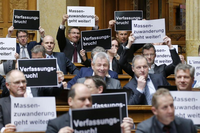 The Swiss People's Party (SVP) protested in the National Council against this "violation of the constitution". Although, as the initiator, they were able to win the referendum, they however failed in its implementation faced with political and economic reality. Under the new legislation immigration would be out of control and the will of the people not respected. They speak of a "humiliating declaration of submission and a surrender to the EU". The party has nevertheless accepted the new reality and limited itself to outraged press statements. They are not seriously considering any legal action nor another referendum.
The Swiss People's Party (SVP) protested in the National Council against this "violation of the constitution". Although, as the initiator, they were able to win the referendum, they however failed in its implementation faced with political and economic reality. Under the new legislation immigration would be out of control and the will of the people not respected. They speak of a "humiliating declaration of submission and a surrender to the EU". The party has nevertheless accepted the new reality and limited itself to outraged press statements. They are not seriously considering any legal action nor another referendum.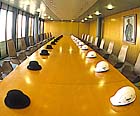
 Legislation which protects employees against reprisals for denouncing corruption or serious wrongdoings in the workplace, came into force on 1 January 2017 in Sweden. There should be no reduction or withholding of pay nor any change in their career prospects. For temporary agency workers, chances of extending their work contract must not be affected negatively. The employer has first to be informed about any incidents and if no remedy is provided, the media or authorities may be informed.
Legislation which protects employees against reprisals for denouncing corruption or serious wrongdoings in the workplace, came into force on 1 January 2017 in Sweden. There should be no reduction or withholding of pay nor any change in their career prospects. For temporary agency workers, chances of extending their work contract must not be affected negatively. The employer has first to be informed about any incidents and if no remedy is provided, the media or authorities may be informed. Whereas the German government relies on a voluntary approach in the matter, the French National Assembly passed legislation, on 29 November 2016, providing due diligence throughout the supply chain. In the future, large French companies are obliged to establish a mandatory "due diligence plan" and to counteract risks in the global supply chain.
Whereas the German government relies on a voluntary approach in the matter, the French National Assembly passed legislation, on 29 November 2016, providing due diligence throughout the supply chain. In the future, large French companies are obliged to establish a mandatory "due diligence plan" and to counteract risks in the global supply chain.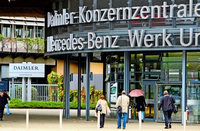 The Daimler group's management and their German central works council reached an agreement in Stuttgart on 28 July 2016, concerning the new key facilities for mobile working. A company agreement from 2009 has been enhanced following the request of many employees and the possibility that tablet computers and smartphones now offers for working irrespective of time and location. In the future, around 100,000 Daimler employees in Germany will have the right to work remotely providing there are no business or technical reasons preventing it. They need only to agree with their superiors on when, how long and how often.
The Daimler group's management and their German central works council reached an agreement in Stuttgart on 28 July 2016, concerning the new key facilities for mobile working. A company agreement from 2009 has been enhanced following the request of many employees and the possibility that tablet computers and smartphones now offers for working irrespective of time and location. In the future, around 100,000 Daimler employees in Germany will have the right to work remotely providing there are no business or technical reasons preventing it. They need only to agree with their superiors on when, how long and how often. On 27 September 2016, the management of Orange (formerly France Télécom) signed an agreement with three trade unions for the first time, on managing the digital transformation for its almost 100,000 French employees. Orange is the largest digital employer in France. It is the first agreement dealing exclusively with this topic concluded within the forty most significant companies listed on the Paris stock exchange index.
On 27 September 2016, the management of Orange (formerly France Télécom) signed an agreement with three trade unions for the first time, on managing the digital transformation for its almost 100,000 French employees. Orange is the largest digital employer in France. It is the first agreement dealing exclusively with this topic concluded within the forty most significant companies listed on the Paris stock exchange index. On 13 December 2016, the German Federal Labour Court ruled that works councils have codetermination rights on the implementation of a company Internet website, if it allows visitors to post critical contributions on the achievements of individual employees. Employer and works council must first negotiate modalities before activating such comments functionalities, for example when and whether criticism on individual employees has to be removed from the Internet.
On 13 December 2016, the German Federal Labour Court ruled that works councils have codetermination rights on the implementation of a company Internet website, if it allows visitors to post critical contributions on the achievements of individual employees. Employer and works council must first negotiate modalities before activating such comments functionalities, for example when and whether criticism on individual employees has to be removed from the Internet. The Euro-forum of Metro met on 23 November 2016 in Düsseldorf. It was the third extraordinary meeting concerning the forthcoming company split-up. The cash and carry and the hypermarket chain, real, are to be separated from the Metro group and the electronics businesses (Media-Saturn) to continue under the new name Ceconomy. The split-up will be effective starting from mid 2017 and should increase the stock market value of both companies.
The Euro-forum of Metro met on 23 November 2016 in Düsseldorf. It was the third extraordinary meeting concerning the forthcoming company split-up. The cash and carry and the hypermarket chain, real, are to be separated from the Metro group and the electronics businesses (Media-Saturn) to continue under the new name Ceconomy. The split-up will be effective starting from mid 2017 and should increase the stock market value of both companies.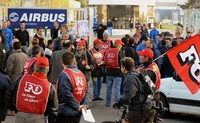 Toulouse becomes the real headquarters for Airbus Group
Toulouse becomes the real headquarters for Airbus Group The world's second largest building materials manufacturer will be founded following the forthcoming acquisition of Italcementi from Bergamo by HeidelbergCement. An agreement on the merger of both European works councils was concluded with the central management on 20 May 2016. Both bodies were established on a "voluntary" basis before September 1996 and therefore, do not fall under the EU Directive. The merger is a reaction to the founding of LafargeHolcim, the new industrial giant based in Switzerland (see
The world's second largest building materials manufacturer will be founded following the forthcoming acquisition of Italcementi from Bergamo by HeidelbergCement. An agreement on the merger of both European works councils was concluded with the central management on 20 May 2016. Both bodies were established on a "voluntary" basis before September 1996 and therefore, do not fall under the EU Directive. The merger is a reaction to the founding of LafargeHolcim, the new industrial giant based in Switzerland (see  French glass manufacturer establishes EWC
French glass manufacturer establishes EWC An agreement for the establishment of the Covestro European Forum was concluded on 16 November 2016 in Leverkusen. This chemicals company, previously operating under the name Bayer MaterialScience was spun-off from the Bayer group and floated on the stock exchange under the new name, in October 2015. Nevertheless, Bayer still currently holds a majority stake. The new Forum is responsible for 15,000 employees in eight EU Member States and Switzerland.
An agreement for the establishment of the Covestro European Forum was concluded on 16 November 2016 in Leverkusen. This chemicals company, previously operating under the name Bayer MaterialScience was spun-off from the Bayer group and floated on the stock exchange under the new name, in October 2015. Nevertheless, Bayer still currently holds a majority stake. The new Forum is responsible for 15,000 employees in eight EU Member States and Switzerland. A EWC agreement was concluded for the first time on 29 April 2016, for the 2,200 employees of Kraiburg Holding in Waldkraiburg (Upper Bavaria). This family business produces technical rubber mixtures particularly for the automobile industry and besides four German sites also has subsidiaries in Austria, Italy and Bulgaria. The EWC agreement has some outstanding as well as exemplary aspects.
A EWC agreement was concluded for the first time on 29 April 2016, for the 2,200 employees of Kraiburg Holding in Waldkraiburg (Upper Bavaria). This family business produces technical rubber mixtures particularly for the automobile industry and besides four German sites also has subsidiaries in Austria, Italy and Bulgaria. The EWC agreement has some outstanding as well as exemplary aspects. US dairies group founds EWC under Spanish jurisdiction
US dairies group founds EWC under Spanish jurisdiction
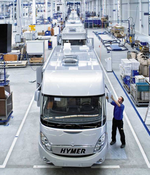 A revised EWC agreement was signed for Hymer on 26 July 2016, at their company headquarters in Bad Waldsee (Baden-Württemberg). This family business is the European market leader in motorhomes and has 3,500 employees in six manufacturing plants in Germany as well as in France and Italy. Following company restructuring it was necessary to adapt the EWC agreement dating from 2000. The EWC is now composed of 19 members, including two each from France and Italy. The 15 German seats were distributed over the different sites. Plenary meetings are held twice annually. The EWC may determine for itself the size of the steering committee in its rules of procedure. It may establish working groups on certain issues and has a right of access to all European sites.
A revised EWC agreement was signed for Hymer on 26 July 2016, at their company headquarters in Bad Waldsee (Baden-Württemberg). This family business is the European market leader in motorhomes and has 3,500 employees in six manufacturing plants in Germany as well as in France and Italy. Following company restructuring it was necessary to adapt the EWC agreement dating from 2000. The EWC is now composed of 19 members, including two each from France and Italy. The 15 German seats were distributed over the different sites. Plenary meetings are held twice annually. The EWC may determine for itself the size of the steering committee in its rules of procedure. It may establish working groups on certain issues and has a right of access to all European sites. A new EWC agreement for the BMT Group was signed on 10 November 2016 in the Jassy plant in Romania (photo). The EWC was established in 2007 under Belgian jurisdiction. The legislation of the Grand Duchy will now apply since the company headquarters has been relocated from Belgium to Luxembourg. The small holding controls five subsidiaries in eight European countries as well as in Asia and America which manufacture gears and molds for glassware. As a financial investor, the BMT Group is interested in further acquisitions and has already prepared the ground for this in the EWC agreement.
A new EWC agreement for the BMT Group was signed on 10 November 2016 in the Jassy plant in Romania (photo). The EWC was established in 2007 under Belgian jurisdiction. The legislation of the Grand Duchy will now apply since the company headquarters has been relocated from Belgium to Luxembourg. The small holding controls five subsidiaries in eight European countries as well as in Asia and America which manufacture gears and molds for glassware. As a financial investor, the BMT Group is interested in further acquisitions and has already prepared the ground for this in the EWC agreement.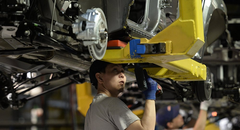 The automobile supplier, Sumitomo Electric Bordnetze from Wolfsburg has begun operating as a SE, since 25 October 2016. With 26,000 employees in 14 countries, the company could hereby avoid codetermination. Without its conversion from a German to a European company, the German works council would have had the right to one third of the seats on the supervisory board. The legal threshold for this had been reached with 500 employees in Germany. The SE agreement from 30 September 2016 completely excludes the employee representatives from participating in the new SE board of directors.
The automobile supplier, Sumitomo Electric Bordnetze from Wolfsburg has begun operating as a SE, since 25 October 2016. With 26,000 employees in 14 countries, the company could hereby avoid codetermination. Without its conversion from a German to a European company, the German works council would have had the right to one third of the seats on the supervisory board. The legal threshold for this had been reached with 500 employees in Germany. The SE agreement from 30 September 2016 completely excludes the employee representatives from participating in the new SE board of directors. An SE participation agreement was signed for Datagroup on 17 August 2016 at their headquarters in Pliezhausen near Stuttgart. The company was entered in the register of commerce on 17 November 2016. Datagroup, with its 1,700 employees in 40 sites, belongs to the top twenty IT service providers in Germany. Above all, the SE conversion was aimed at keeping employee representatives away from the supervisory board of this rapidly growing company.
An SE participation agreement was signed for Datagroup on 17 August 2016 at their headquarters in Pliezhausen near Stuttgart. The company was entered in the register of commerce on 17 November 2016. Datagroup, with its 1,700 employees in 40 sites, belongs to the top twenty IT service providers in Germany. Above all, the SE conversion was aimed at keeping employee representatives away from the supervisory board of this rapidly growing company.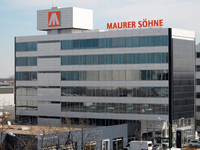
 On 9 and 10 November 2016, employee representatives of the British arms dealer BAE Systems coming from Australia, Chile, the USA and the United Kingdom met in Mandurah, a coastal town in Western Australia, to co-ordinate their future strategy. The worldwide network was established in November 2014 and, since then, had only been communicating via video conference. In the future, representatives from Australia and the USA will participate twice annually in a trade union forum, which British unions are organizing together with management in London.
On 9 and 10 November 2016, employee representatives of the British arms dealer BAE Systems coming from Australia, Chile, the USA and the United Kingdom met in Mandurah, a coastal town in Western Australia, to co-ordinate their future strategy. The worldwide network was established in November 2014 and, since then, had only been communicating via video conference. In the future, representatives from Australia and the USA will participate twice annually in a trade union forum, which British unions are organizing together with management in London.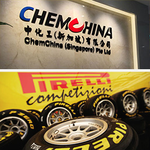 The second annual meeting of the Pirelli trade union network was held on 30 November and 1 December 2016 in Turin. Participants from six countries in Latin America and Europe discussed the group's policies and working conditions. In these countries the Pirelli workforce is unionized to over 80%. In the future, the network wants to expand further towards the USA and Russia. At the meeting, central management was criticized for its unwillingness to co-operate constructively with the European works council. Pirelli has been a subsidiary of the Chinese group ChemChina since October 2015.
The second annual meeting of the Pirelli trade union network was held on 30 November and 1 December 2016 in Turin. Participants from six countries in Latin America and Europe discussed the group's policies and working conditions. In these countries the Pirelli workforce is unionized to over 80%. In the future, the network wants to expand further towards the USA and Russia. At the meeting, central management was criticized for its unwillingness to co-operate constructively with the European works council. Pirelli has been a subsidiary of the Chinese group ChemChina since October 2015.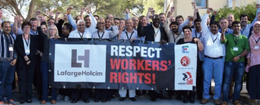 Trade unions held a worldwide day of action at LafargeHolcim on 9 December 2016, to draw attention to the numerous violations against employee rights. Under criticism are the high number of deaths due to industrial accidents, precarious jobs and unwillingness of the company to conclude an international framework agreement with trade unions. The third worldwide trade union conference for LafargeHolcim had been held from 17 to 19 October 2016 in Hyères on the French Riviera. The unsatisfactory consultation of the European works council had also come under criticism in February 2016 (see
Trade unions held a worldwide day of action at LafargeHolcim on 9 December 2016, to draw attention to the numerous violations against employee rights. Under criticism are the high number of deaths due to industrial accidents, precarious jobs and unwillingness of the company to conclude an international framework agreement with trade unions. The third worldwide trade union conference for LafargeHolcim had been held from 17 to 19 October 2016 in Hyères on the French Riviera. The unsatisfactory consultation of the European works council had also come under criticism in February 2016 (see  The food unions of the CGIL trade union confederation from Italy and the CC.OO. from Spain present their joint EWC project on a website. It aims at qualifying EWC members from Conserve Italia, the delicatessen goods manufacturer and the Spanish meat processor, Campofrio.
The food unions of the CGIL trade union confederation from Italy and the CC.OO. from Spain present their joint EWC project on a website. It aims at qualifying EWC members from Conserve Italia, the delicatessen goods manufacturer and the Spanish meat processor, Campofrio. A new website was launched on 10 October 2016, to inform employees on the risks of carcinogenic substances. The six initiators, which include the European Trade Union Confederation and the employer federation, BusinessEurope, wish to foster awareness on the topic through a "Roadmap" and promote an exchange on innovative practices.
A new website was launched on 10 October 2016, to inform employees on the risks of carcinogenic substances. The six initiators, which include the European Trade Union Confederation and the employer federation, BusinessEurope, wish to foster awareness on the topic through a "Roadmap" and promote an exchange on innovative practices. The ToUChstone Blog is an informal platform, where staff members of the national head office of the British Trade Union Confederation (TUC), may express themselves on current political topics. The contributions do not necessarily represent the official opinion of the TUC. The opinions also deal with topics on which there has not yet been an official position taken.
The ToUChstone Blog is an informal platform, where staff members of the national head office of the British Trade Union Confederation (TUC), may express themselves on current political topics. The contributions do not necessarily represent the official opinion of the TUC. The opinions also deal with topics on which there has not yet been an official position taken. Fight against works councils
Fight against works councils The Institute for the Promotion of Employment in South Tyrol published a new manual on collective labour relations in Italy, in July 2016. Whereas Germany and Austria benefit from a strong codetermination, Italy is considered as country with a relatively weak employee participation. In general, fundamental principles governing industrial relations and bargaining rights are not regulated by the legislator, but by the social partners on their own, as most recently in January 2014 (see
The Institute for the Promotion of Employment in South Tyrol published a new manual on collective labour relations in Italy, in July 2016. Whereas Germany and Austria benefit from a strong codetermination, Italy is considered as country with a relatively weak employee participation. In general, fundamental principles governing industrial relations and bargaining rights are not regulated by the legislator, but by the social partners on their own, as most recently in January 2014 (see  Overview of the labour relations in four countries
Overview of the labour relations in four countries  Company takeovers - what rights do works council have?
Company takeovers - what rights do works council have? In November 2016, the Friedrich Ebert Foundation published this analysis of the current situation of labour legislation, collective bargaining and trade unions in one of the largest EU Member States of Eastern Europe. A reform of collective labour legislation, initiated in May 2011 by the conservative government at the time, was the most extensive since the fall of communism and led to lasting discord between government and both social partners. The governing Social Democrats, in power since May 2012, wanted to cancel the reform but did not stick to their promise (see
In November 2016, the Friedrich Ebert Foundation published this analysis of the current situation of labour legislation, collective bargaining and trade unions in one of the largest EU Member States of Eastern Europe. A reform of collective labour legislation, initiated in May 2011 by the conservative government at the time, was the most extensive since the fall of communism and led to lasting discord between government and both social partners. The governing Social Democrats, in power since May 2012, wanted to cancel the reform but did not stick to their promise (see 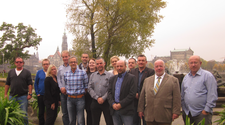 Works council members from seven companies gathered from 26 to 28 October 2016 in Dresden to gain knowledge with past EWC case law, the structuring of EWC agreements and the application of EU legislation in cases of legal uncertainty. Since around half of the participants were working under British jurisdiction, the seminar also covered the most recent ruling of the Central Arbitration Committee (CAC) in London from 19 January 2016 (see
Works council members from seven companies gathered from 26 to 28 October 2016 in Dresden to gain knowledge with past EWC case law, the structuring of EWC agreements and the application of EU legislation in cases of legal uncertainty. Since around half of the participants were working under British jurisdiction, the seminar also covered the most recent ruling of the Central Arbitration Committee (CAC) in London from 19 January 2016 (see  On 10 and 11 November 2016, the EWC steering committee of Sabic came for training to the EWC Academy in Hamburg. The company, which is owned by the Saudi Arabian State started acquiring European production plants from other companies in 2002, particularly in the Netherlands, where today the European headquarters are located, as well as in Germany, Spain and England. The EWC was established in 2012 under Dutch jurisdiction.
On 10 and 11 November 2016, the EWC steering committee of Sabic came for training to the EWC Academy in Hamburg. The company, which is owned by the Saudi Arabian State started acquiring European production plants from other companies in 2002, particularly in the Netherlands, where today the European headquarters are located, as well as in Germany, Spain and England. The EWC was established in 2012 under Dutch jurisdiction.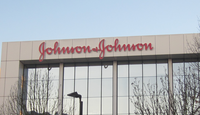 The select committee of Johnson & Johnson's European works council met on 5 and 6 December 2016 close to Brussels. A draft text for updating the EWC agreement was discussed with support of the EWC Academy. The consumer goods and pharmaceuticals group has a EWC in place since 1998 under Belgian jurisdiction, which falls completely under the scope of the new EU Directive. Negotiations will be particularly focused on the implementation of the information and consultation procedure. The representatives are being confronted with substantial restructuring at an ever increasing pace.
The select committee of Johnson & Johnson's European works council met on 5 and 6 December 2016 close to Brussels. A draft text for updating the EWC agreement was discussed with support of the EWC Academy. The consumer goods and pharmaceuticals group has a EWC in place since 1998 under Belgian jurisdiction, which falls completely under the scope of the new EU Directive. Negotiations will be particularly focused on the implementation of the information and consultation procedure. The representatives are being confronted with substantial restructuring at an ever increasing pace. As every year, a two-day conference is being held in January. It will be simultaneously interpreted (German - English).
As every year, a two-day conference is being held in January. It will be simultaneously interpreted (German - English). Our annual seminar in Montabaur Castle is being organized from 18 to 21 April 2017 (high-speed train station half-way between Frankfurt and Cologne). The following topics are offered in parallel:
Our annual seminar in Montabaur Castle is being organized from 18 to 21 April 2017 (high-speed train station half-way between Frankfurt and Cologne). The following topics are offered in parallel: A seminar on industrial relations in the USA is being held from 12 to 14 June 2017 in Berlin. Besides a retrospective of the historical developments, there will be a focus on the current situation following the presidential elections. The seminar is addressed to works council members from US companies as well as from European companies with large sites in the USA. The speakers will include Hermann Nehls, Counselor for Labour, Health and Social Affairs at the German Embassy in the USA, and Thomas Greven, lecturer at the John F. Kennedy Institute for North American studies at the Free University of Berlin and former staff member in the office of Bernie Sanders. The program will be published shortly.
A seminar on industrial relations in the USA is being held from 12 to 14 June 2017 in Berlin. Besides a retrospective of the historical developments, there will be a focus on the current situation following the presidential elections. The seminar is addressed to works council members from US companies as well as from European companies with large sites in the USA. The speakers will include Hermann Nehls, Counselor for Labour, Health and Social Affairs at the German Embassy in the USA, and Thomas Greven, lecturer at the John F. Kennedy Institute for North American studies at the Free University of Berlin and former staff member in the office of Bernie Sanders. The program will be published shortly. Seminar on the new EU data protection regulation
Seminar on the new EU data protection regulation A seminar on Chinese labour relations and intercultural aspects will be organized mid-October 2017 in Munich. It is addressed to works council members who have to deal with investors from China or those having subsidiaries in China. The seminar includes also a site visit to Krauss-Maffei. This mechanical engineering company was acquired by a Chinese company at the beginning of 2016. The works council will report on its experiences.
A seminar on Chinese labour relations and intercultural aspects will be organized mid-October 2017 in Munich. It is addressed to works council members who have to deal with investors from China or those having subsidiaries in China. The seminar includes also a site visit to Krauss-Maffei. This mechanical engineering company was acquired by a Chinese company at the beginning of 2016. The works council will report on its experiences.